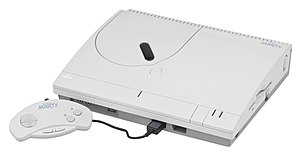Fujitsu FM Towns Marty

FM Towns Marty console with controller
|
|
| Manufacturer | Fujitsu |
|---|---|
| Type | Home video game console |
| Generation | Fifth generation (32-bit/64-bit era) |
| Release date |
|
| Discontinued |
|
| Units sold | 45,000 (as of December 31, 1993) |
| Media | CD-ROM, 3½-inch floppy disks |
| CPU | AMD 386SX at 16 MHz |
| Memory | 2 MB |
| Display | 352x232 – 640x480 resolutions, 256 colors on-screen out of a palette of 32 768 |
| Sound |
|
| Backward compatibility |
FM Towns |
The FM Towns Marty (エフエムタウンズマーティー Efu Emu Taunzu Mātī) is a fifth-generation home video game console released in 1991 by Fujitsu, exclusively for the Japanese market. It was the first 32-bit home video game system, and came complete with a built in CD-ROM drive and disk drive. It was based on the earlier FM Towns computer system Fujitsu had released in 1989. The Marty was backward-compatible with older FM Towns games.
In 1994 a new version of the console called the FM Towns Marty 2 (エフエムタウンズマーティー2 Efu Emu Taunzu Mātī Tsū) was released. It featured a darker gray shell and a new lower price (66,000 yen or 670 USD) but was otherwise identical to the first Marty. It is widely believed that the FM Towns Marty 2 would feature similar improvements to the FM Towns 2, which had a swifter CPU than the first, but this is not the case. It has also been speculated that the Marty 2 featured a 486 CPU, however this was also discovered to be false.
There is also the FM Towns Car Marty (エフエムタウンズカーマーティー Efu Emu Taunzu Kā Mātī) for installation in automobiles. It included a built in navigation system with audio and video guidance, and could also be detached from the car and played at home. It came in two versions, the MVP-1 (released in April 1994) and MVP-10 (released in November 1994). The only difference between the MVP-1 and MVP-10 is the drive mechanisms. There has been speculation that the MVP-10 was introduced since the MVP-1 broke easily. An optional IC Card for the FM Towns Car Marty allowed it to use VICS, and was subsequently sold with a video monitor.
...
Wikipedia
